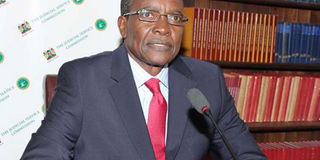As Chief Justice, Maraga will be huge letdown to progressive forces in Kenya

Justice David Maraga before the Judicial Service Commission for an interview for the position of Chief Justice at the Supreme Court building in Nairobi on August 31, 2016. On September 22, 2016, the group nominated him for the job. PHOTO | DENNIS ONSONGO | NATION MEDIA GROUP
What you need to know:
- According to media reports, which he has not denied, David Maraga, now 65, spent 25 years in private practice, almost entirely in Nakuru.
- These 25 years run concurrently parallel to the 24-year despotic rule of Daniel arap Moi – from 1978 to 2002.
Who exactly is David Maraga, in the context of his history of advancing civil rights, expanding the democratic space and standing up for the independence of the judiciary; particularly against the Executive’s overbearing reach?
According media reports, which he has not denied, Maraga, now 65, spent 25 years in private practice, almost entirely in Nakuru. These 25 years run concurrently parallel to the 24-year despotic rule of Daniel arap Moi – from 1978 to 2002.
The hallmark of these Nyayo “error”, single political party rule years was a horrible clampdown on dissent, marked by official State brutality against those who opposed arap Moi’s dictatorship. Conscientious dissenters were labelled foreign stooges, and physically targeted for torture, detention without trial and their businesses and careers ruined.
The watershed years of these trying times in Kenya’s history came in 1982, 1988 and 1991. In 1982 there was the unsuccessful military coup against arap Moi. In 1988, there was the infamous and farcical mlolongo General Election. In 1991, after sustained pressure, the Kanu regime buckled and allowed political pluralism.
What has all this got to do with chief justice nominee Maraga, one may ask? A lot, actually.
The brave men and women who risked life and limb to stand up to arap Moi’s vile rule were mainly lawyers.
These lawyers first came to the limelight through taking up (mainly pro-borno) the defences of the soldiers implicated in the 1982 unsuccessful coup. Taking up these cases made one a marked man by the State.
ACTIONS CELEBRATED
These lawyers’ (all of whom are Maraga’s contemporaries) actions are still celebrated today by citizens of conscience.
The name David Maraga is, however, conspicuous by its absence in this list of honour.
Among others who made this list are John Khaminwa, Rumba Kinuthia, Wanyiri Kihoro, Paul Muite, James Orengo, Gibson Kamau Kuria, Willy Mutunga, Mohammed Ibrahim, Kiraitu Murungi, Gitobu Imanyara, Geoffrey Simiyu and Arafat Aswani, among others.
His own Nakuru practice turf was quite a hotbed of political activism, but Maraga seemingly chose to look the other way, as the State continued its vicious and unrelenting violation of its citizenry’s rights.
From Nakuru leaders like Mark Mwithaga and John Kamangara were vociferous in their opposition to the State’s undemocratic and illegitimate actions.
Lawyers who defended dissenters were marked. Other lawyers defended the State’s actions and were duly rewarded with mainly land parcels and government work. In this group was the late Mutula Kilonzo.
The rest sat on the fence and can be labelled as cowards.
Even in his local chapter of the Rift Valley Law Society of Kenya, Maraga’s name seemingly did not feature, as a voice against the State’s vile actions.
Having missed out in 1982 to make a name for himself as a valued member of the class of human rights defenders, another opportunity presented itself to Maraga in 1988.
CHALLENGE SYSTEM
Scores of petitioners went to the very discredited courts to challenge the farce that was the mlolongo (queue voting) system. Again, Maraga’s name seemingly does not feature anywhere as being among the brave lawyers who took up these difficult briefs.
He, as it were, continued to lie low for another 15 years and only sought appointment to join the judiciary after the infamous so-called “radical surgery” of the judiciary in 2003.
From the foregoing, Maraga’s 25 years in private practice were unremarkable, some might even say colourless.
If he had a private practice worth talking about, why did he shut it down and not decline the appoinment to the Bench?
One Richard Omwela of Hamilton, Harrison and Mathews turned down such an appointment at the same time that Maraga accepted his.
In ending, I would posit that as chief justice, David Maraga will be a huge letdown to progressive forces in Kenya.
His name cannot be mentioned in the same breath as that of Willy Mutunga or Chunnilal Bhagwandas Madan.
With the Law Society of Kenya in no mood to tolerate a system that panders to external forces, Maraga is extremely unlikely to last the course. And, even if he does, he will probably exit with a whimp as did Bernard Chunga and Zaccheaus Chesoni.
As the old saying goes, a lizard in Africa will not become an alligator in America.
Charles Ouko is a freelance journalist.




